UNCC100 - Catholic Social Thought: Principles and Analysis
VerifiedAdded on 2022/09/17
|6
|1310
|26
Homework Assignment
AI Summary
This document provides an analysis of Catholic Social Thought (CST), focusing on its principles and applications. It explores the core tenets of CST, including human dignity, common good, and solidarity, and how these principles shape the relationship between individuals and society. The document delves into the importance of human dignity as a cornerstone of moral vision, emphasizing the inherent value of each individual. It examines the common good and its role in promoting social structures that foster individual growth and well-being, and how these elements are intertwined with human dignity. The principle of solidarity, emphasizing the interconnectedness of all people, is also discussed, along with the African philosophy of Ubuntu. The document highlights the interrelationship between the self and the community within the framework of society, the importance of individual participation, and the role of CST in addressing societal issues and promoting a just and equitable world. The document makes references to the provided assignment brief and relevant academic sources.
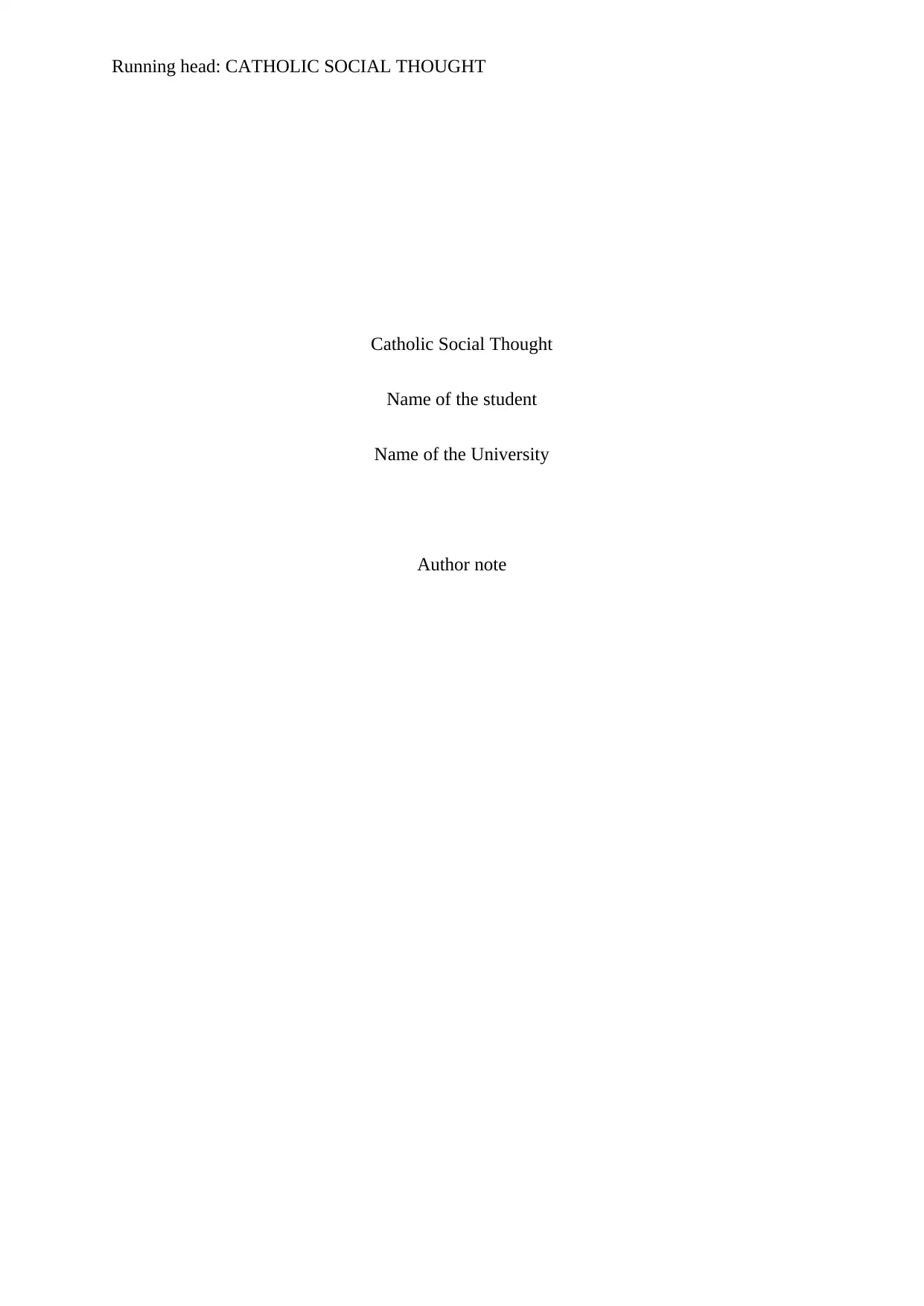
Running head: CATHOLIC SOCIAL THOUGHT
Catholic Social Thought
Name of the student
Name of the University
Author note
Catholic Social Thought
Name of the student
Name of the University
Author note
Paraphrase This Document
Need a fresh take? Get an instant paraphrase of this document with our AI Paraphraser
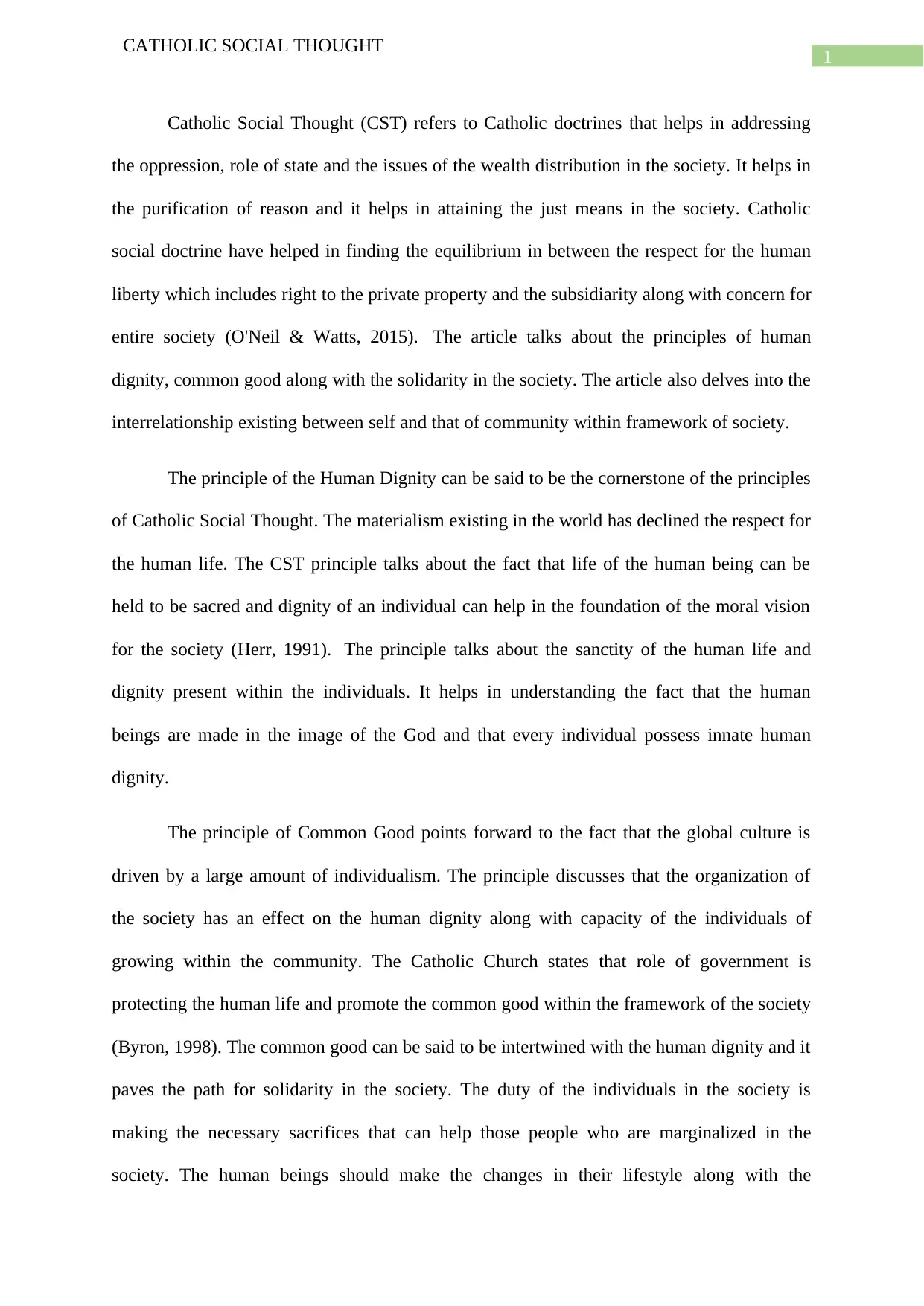
1
CATHOLIC SOCIAL THOUGHT
Catholic Social Thought (CST) refers to Catholic doctrines that helps in addressing
the oppression, role of state and the issues of the wealth distribution in the society. It helps in
the purification of reason and it helps in attaining the just means in the society. Catholic
social doctrine have helped in finding the equilibrium in between the respect for the human
liberty which includes right to the private property and the subsidiarity along with concern for
entire society (O'Neil & Watts, 2015). The article talks about the principles of human
dignity, common good along with the solidarity in the society. The article also delves into the
interrelationship existing between self and that of community within framework of society.
The principle of the Human Dignity can be said to be the cornerstone of the principles
of Catholic Social Thought. The materialism existing in the world has declined the respect for
the human life. The CST principle talks about the fact that life of the human being can be
held to be sacred and dignity of an individual can help in the foundation of the moral vision
for the society (Herr, 1991). The principle talks about the sanctity of the human life and
dignity present within the individuals. It helps in understanding the fact that the human
beings are made in the image of the God and that every individual possess innate human
dignity.
The principle of Common Good points forward to the fact that the global culture is
driven by a large amount of individualism. The principle discusses that the organization of
the society has an effect on the human dignity along with capacity of the individuals of
growing within the community. The Catholic Church states that role of government is
protecting the human life and promote the common good within the framework of the society
(Byron, 1998). The common good can be said to be intertwined with the human dignity and it
paves the path for solidarity in the society. The duty of the individuals in the society is
making the necessary sacrifices that can help those people who are marginalized in the
society. The human beings should make the changes in their lifestyle along with the
CATHOLIC SOCIAL THOUGHT
Catholic Social Thought (CST) refers to Catholic doctrines that helps in addressing
the oppression, role of state and the issues of the wealth distribution in the society. It helps in
the purification of reason and it helps in attaining the just means in the society. Catholic
social doctrine have helped in finding the equilibrium in between the respect for the human
liberty which includes right to the private property and the subsidiarity along with concern for
entire society (O'Neil & Watts, 2015). The article talks about the principles of human
dignity, common good along with the solidarity in the society. The article also delves into the
interrelationship existing between self and that of community within framework of society.
The principle of the Human Dignity can be said to be the cornerstone of the principles
of Catholic Social Thought. The materialism existing in the world has declined the respect for
the human life. The CST principle talks about the fact that life of the human being can be
held to be sacred and dignity of an individual can help in the foundation of the moral vision
for the society (Herr, 1991). The principle talks about the sanctity of the human life and
dignity present within the individuals. It helps in understanding the fact that the human
beings are made in the image of the God and that every individual possess innate human
dignity.
The principle of Common Good points forward to the fact that the global culture is
driven by a large amount of individualism. The principle discusses that the organization of
the society has an effect on the human dignity along with capacity of the individuals of
growing within the community. The Catholic Church states that role of government is
protecting the human life and promote the common good within the framework of the society
(Byron, 1998). The common good can be said to be intertwined with the human dignity and it
paves the path for solidarity in the society. The duty of the individuals in the society is
making the necessary sacrifices that can help those people who are marginalized in the
society. The human beings should make the changes in their lifestyle along with the
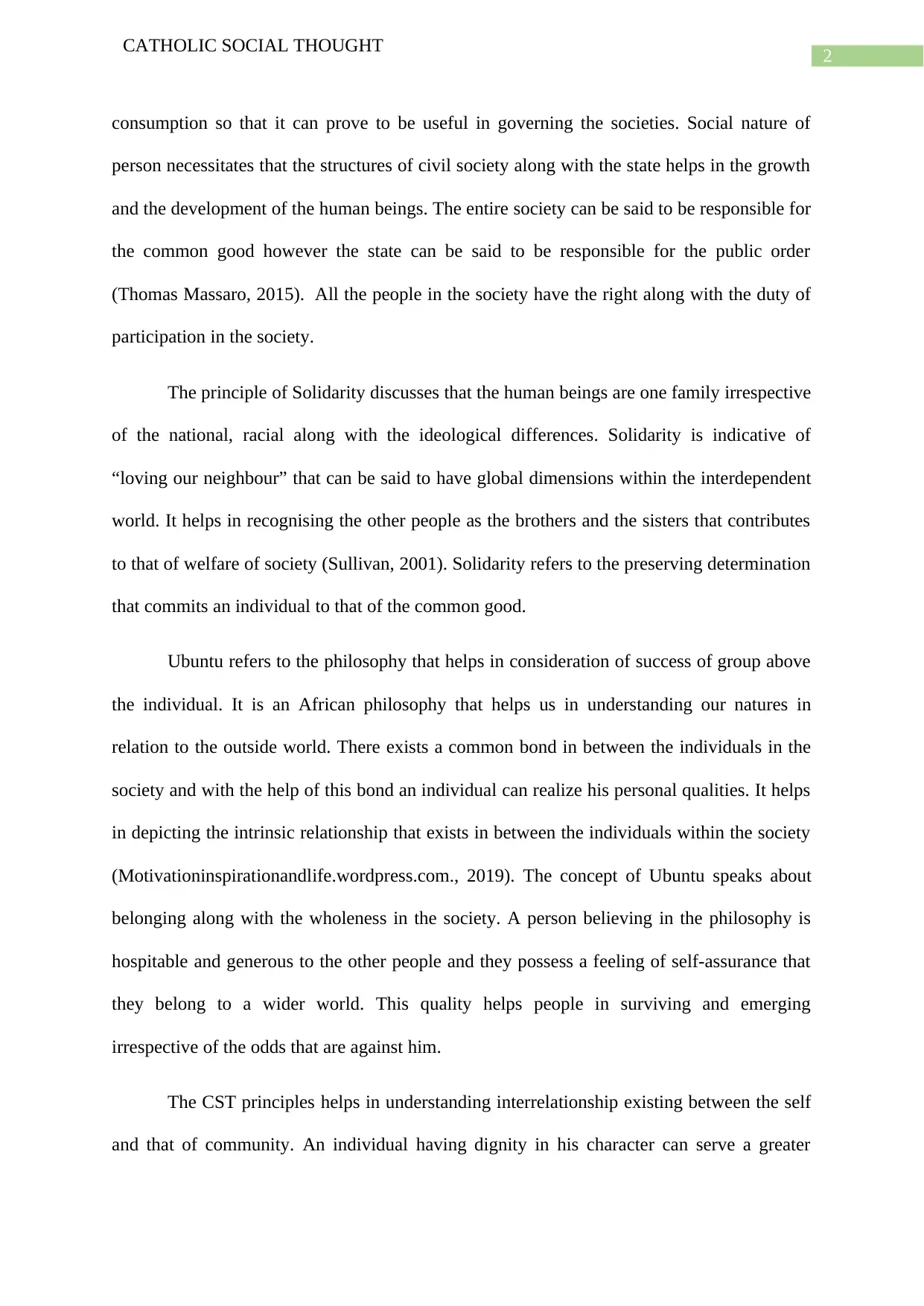
2
CATHOLIC SOCIAL THOUGHT
consumption so that it can prove to be useful in governing the societies. Social nature of
person necessitates that the structures of civil society along with the state helps in the growth
and the development of the human beings. The entire society can be said to be responsible for
the common good however the state can be said to be responsible for the public order
(Thomas Massaro, 2015). All the people in the society have the right along with the duty of
participation in the society.
The principle of Solidarity discusses that the human beings are one family irrespective
of the national, racial along with the ideological differences. Solidarity is indicative of
“loving our neighbour” that can be said to have global dimensions within the interdependent
world. It helps in recognising the other people as the brothers and the sisters that contributes
to that of welfare of society (Sullivan, 2001). Solidarity refers to the preserving determination
that commits an individual to that of the common good.
Ubuntu refers to the philosophy that helps in consideration of success of group above
the individual. It is an African philosophy that helps us in understanding our natures in
relation to the outside world. There exists a common bond in between the individuals in the
society and with the help of this bond an individual can realize his personal qualities. It helps
in depicting the intrinsic relationship that exists in between the individuals within the society
(Motivationinspirationandlife.wordpress.com., 2019). The concept of Ubuntu speaks about
belonging along with the wholeness in the society. A person believing in the philosophy is
hospitable and generous to the other people and they possess a feeling of self-assurance that
they belong to a wider world. This quality helps people in surviving and emerging
irrespective of the odds that are against him.
The CST principles helps in understanding interrelationship existing between the self
and that of community. An individual having dignity in his character can serve a greater
CATHOLIC SOCIAL THOUGHT
consumption so that it can prove to be useful in governing the societies. Social nature of
person necessitates that the structures of civil society along with the state helps in the growth
and the development of the human beings. The entire society can be said to be responsible for
the common good however the state can be said to be responsible for the public order
(Thomas Massaro, 2015). All the people in the society have the right along with the duty of
participation in the society.
The principle of Solidarity discusses that the human beings are one family irrespective
of the national, racial along with the ideological differences. Solidarity is indicative of
“loving our neighbour” that can be said to have global dimensions within the interdependent
world. It helps in recognising the other people as the brothers and the sisters that contributes
to that of welfare of society (Sullivan, 2001). Solidarity refers to the preserving determination
that commits an individual to that of the common good.
Ubuntu refers to the philosophy that helps in consideration of success of group above
the individual. It is an African philosophy that helps us in understanding our natures in
relation to the outside world. There exists a common bond in between the individuals in the
society and with the help of this bond an individual can realize his personal qualities. It helps
in depicting the intrinsic relationship that exists in between the individuals within the society
(Motivationinspirationandlife.wordpress.com., 2019). The concept of Ubuntu speaks about
belonging along with the wholeness in the society. A person believing in the philosophy is
hospitable and generous to the other people and they possess a feeling of self-assurance that
they belong to a wider world. This quality helps people in surviving and emerging
irrespective of the odds that are against him.
The CST principles helps in understanding interrelationship existing between the self
and that of community. An individual having dignity in his character can serve a greater
⊘ This is a preview!⊘
Do you want full access?
Subscribe today to unlock all pages.

Trusted by 1+ million students worldwide
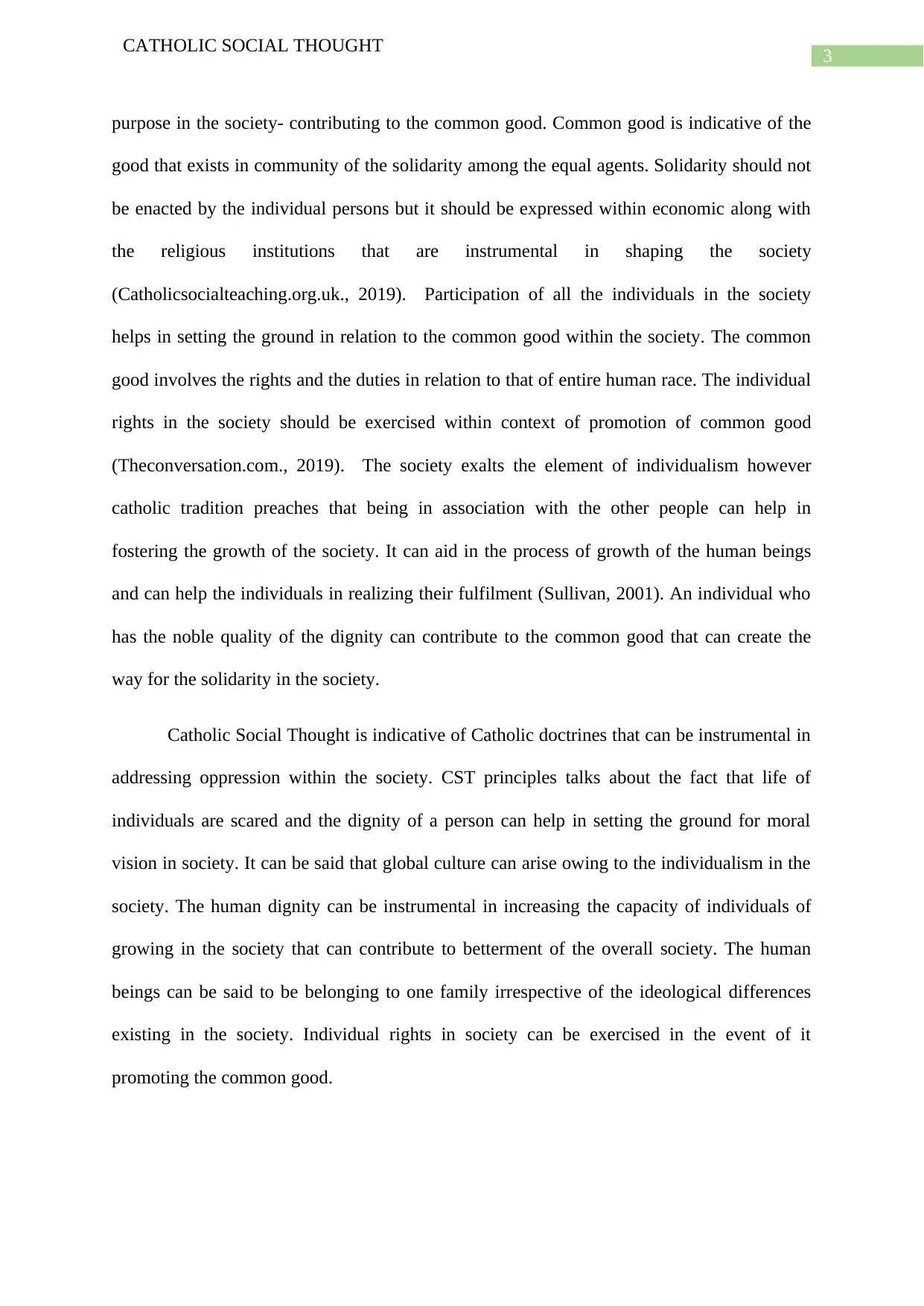
3
CATHOLIC SOCIAL THOUGHT
purpose in the society- contributing to the common good. Common good is indicative of the
good that exists in community of the solidarity among the equal agents. Solidarity should not
be enacted by the individual persons but it should be expressed within economic along with
the religious institutions that are instrumental in shaping the society
(Catholicsocialteaching.org.uk., 2019). Participation of all the individuals in the society
helps in setting the ground in relation to the common good within the society. The common
good involves the rights and the duties in relation to that of entire human race. The individual
rights in the society should be exercised within context of promotion of common good
(Theconversation.com., 2019). The society exalts the element of individualism however
catholic tradition preaches that being in association with the other people can help in
fostering the growth of the society. It can aid in the process of growth of the human beings
and can help the individuals in realizing their fulfilment (Sullivan, 2001). An individual who
has the noble quality of the dignity can contribute to the common good that can create the
way for the solidarity in the society.
Catholic Social Thought is indicative of Catholic doctrines that can be instrumental in
addressing oppression within the society. CST principles talks about the fact that life of
individuals are scared and the dignity of a person can help in setting the ground for moral
vision in society. It can be said that global culture can arise owing to the individualism in the
society. The human dignity can be instrumental in increasing the capacity of individuals of
growing in the society that can contribute to betterment of the overall society. The human
beings can be said to be belonging to one family irrespective of the ideological differences
existing in the society. Individual rights in society can be exercised in the event of it
promoting the common good.
CATHOLIC SOCIAL THOUGHT
purpose in the society- contributing to the common good. Common good is indicative of the
good that exists in community of the solidarity among the equal agents. Solidarity should not
be enacted by the individual persons but it should be expressed within economic along with
the religious institutions that are instrumental in shaping the society
(Catholicsocialteaching.org.uk., 2019). Participation of all the individuals in the society
helps in setting the ground in relation to the common good within the society. The common
good involves the rights and the duties in relation to that of entire human race. The individual
rights in the society should be exercised within context of promotion of common good
(Theconversation.com., 2019). The society exalts the element of individualism however
catholic tradition preaches that being in association with the other people can help in
fostering the growth of the society. It can aid in the process of growth of the human beings
and can help the individuals in realizing their fulfilment (Sullivan, 2001). An individual who
has the noble quality of the dignity can contribute to the common good that can create the
way for the solidarity in the society.
Catholic Social Thought is indicative of Catholic doctrines that can be instrumental in
addressing oppression within the society. CST principles talks about the fact that life of
individuals are scared and the dignity of a person can help in setting the ground for moral
vision in society. It can be said that global culture can arise owing to the individualism in the
society. The human dignity can be instrumental in increasing the capacity of individuals of
growing in the society that can contribute to betterment of the overall society. The human
beings can be said to be belonging to one family irrespective of the ideological differences
existing in the society. Individual rights in society can be exercised in the event of it
promoting the common good.
Paraphrase This Document
Need a fresh take? Get an instant paraphrase of this document with our AI Paraphraser

4
CATHOLIC SOCIAL THOUGHT
CATHOLIC SOCIAL THOUGHT
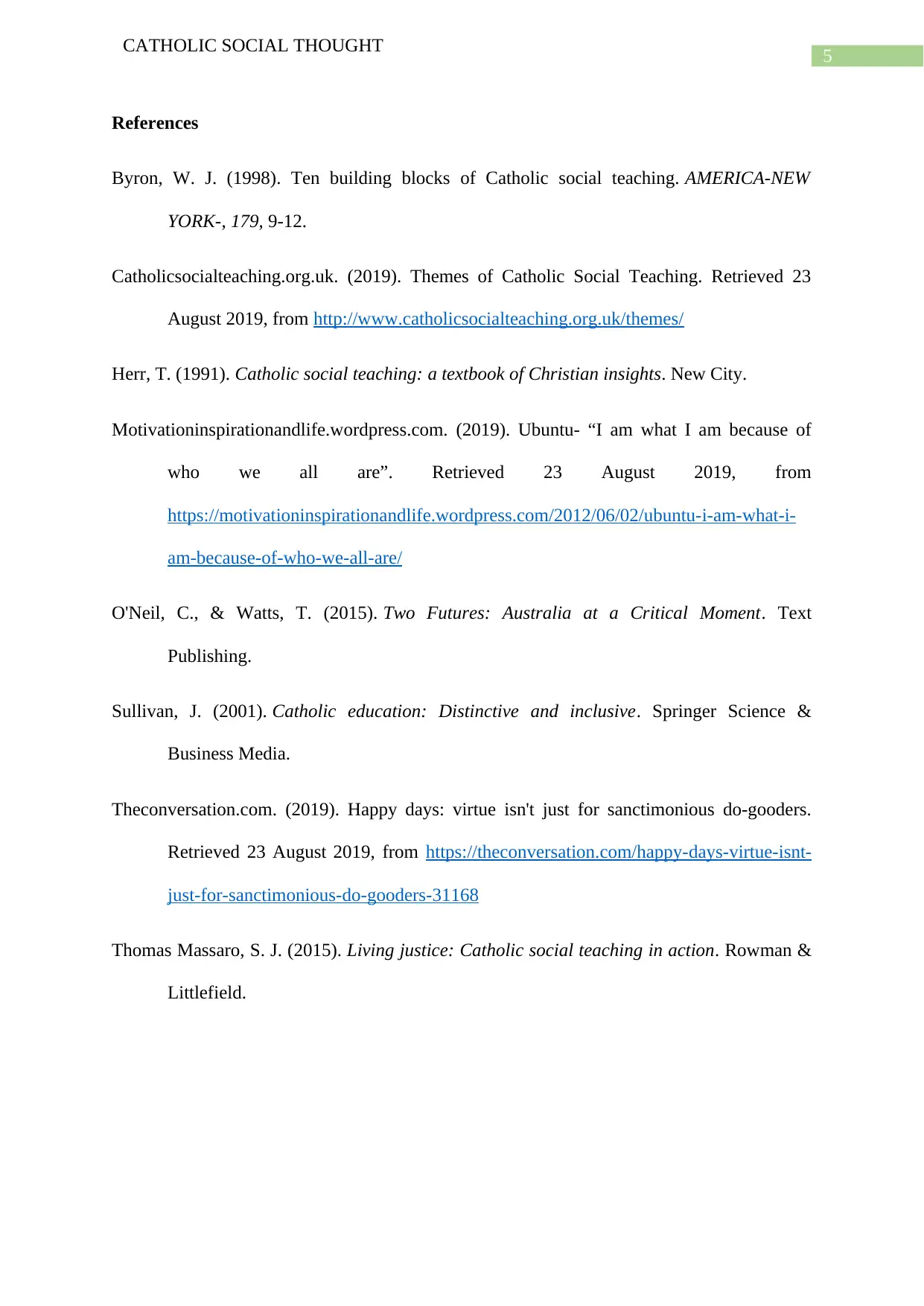
5
CATHOLIC SOCIAL THOUGHT
References
Byron, W. J. (1998). Ten building blocks of Catholic social teaching. AMERICA-NEW
YORK-, 179, 9-12.
Catholicsocialteaching.org.uk. (2019). Themes of Catholic Social Teaching. Retrieved 23
August 2019, from http://www.catholicsocialteaching.org.uk/themes/
Herr, T. (1991). Catholic social teaching: a textbook of Christian insights. New City.
Motivationinspirationandlife.wordpress.com. (2019). Ubuntu- “I am what I am because of
who we all are”. Retrieved 23 August 2019, from
https://motivationinspirationandlife.wordpress.com/2012/06/02/ubuntu-i-am-what-i-
am-because-of-who-we-all-are/
O'Neil, C., & Watts, T. (2015). Two Futures: Australia at a Critical Moment. Text
Publishing.
Sullivan, J. (2001). Catholic education: Distinctive and inclusive. Springer Science &
Business Media.
Theconversation.com. (2019). Happy days: virtue isn't just for sanctimonious do-gooders.
Retrieved 23 August 2019, from https://theconversation.com/happy-days-virtue-isnt-
just-for-sanctimonious-do-gooders-31168
Thomas Massaro, S. J. (2015). Living justice: Catholic social teaching in action. Rowman &
Littlefield.
CATHOLIC SOCIAL THOUGHT
References
Byron, W. J. (1998). Ten building blocks of Catholic social teaching. AMERICA-NEW
YORK-, 179, 9-12.
Catholicsocialteaching.org.uk. (2019). Themes of Catholic Social Teaching. Retrieved 23
August 2019, from http://www.catholicsocialteaching.org.uk/themes/
Herr, T. (1991). Catholic social teaching: a textbook of Christian insights. New City.
Motivationinspirationandlife.wordpress.com. (2019). Ubuntu- “I am what I am because of
who we all are”. Retrieved 23 August 2019, from
https://motivationinspirationandlife.wordpress.com/2012/06/02/ubuntu-i-am-what-i-
am-because-of-who-we-all-are/
O'Neil, C., & Watts, T. (2015). Two Futures: Australia at a Critical Moment. Text
Publishing.
Sullivan, J. (2001). Catholic education: Distinctive and inclusive. Springer Science &
Business Media.
Theconversation.com. (2019). Happy days: virtue isn't just for sanctimonious do-gooders.
Retrieved 23 August 2019, from https://theconversation.com/happy-days-virtue-isnt-
just-for-sanctimonious-do-gooders-31168
Thomas Massaro, S. J. (2015). Living justice: Catholic social teaching in action. Rowman &
Littlefield.
⊘ This is a preview!⊘
Do you want full access?
Subscribe today to unlock all pages.

Trusted by 1+ million students worldwide
1 out of 6
Related Documents
Your All-in-One AI-Powered Toolkit for Academic Success.
+13062052269
info@desklib.com
Available 24*7 on WhatsApp / Email
![[object Object]](/_next/static/media/star-bottom.7253800d.svg)
Unlock your academic potential
Copyright © 2020–2026 A2Z Services. All Rights Reserved. Developed and managed by ZUCOL.


